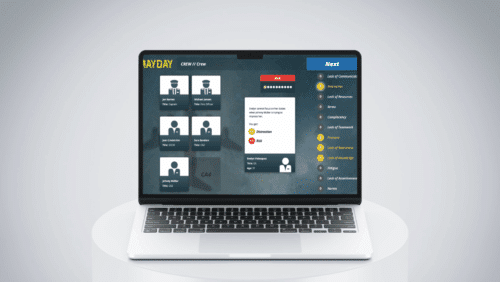Principles of CRM: From the Classroom to the Sky
Over the past 50 years, Crew Resource Management has helped improve safety and significantly reduced the accident rate by focusing on the human factor. The training reinforces the ability of pilots and cabin crew to communicate effectively, make decisions under pressure, assess the situation, exert leadership, and manage risks. Skills which create a safer and more efficient operational environment.
CRM is built on the principle that good non-technical skills help reduce errors and improve overall safety.
Principles of CRM
But what are non-technical skills? And how do they relate to the principles of CRM?
The term “non-technical skills” covers the cognitive, social, and interpersonal abilities of pilots and cabin crew to support safe and efficient operations. Being able to communicate, work together as a team, and make decisions is closely linked to the principles of CRM. These skills enable the crew to manage risks, coordinate activities on board, and mitigate human errors.
Let us take a look at the key principles of CRM:
- Communication: It is vital that the crew practices clear, concise, and unambiguous communication and active listening. This ensures that everyone understands the situation and the tasks at hand – and knows about potential hazards, threats, and risks during the flight. An open communication culture also promotes assertiveness. This means that people are not afraid to speak up and voice safety concerns. Without fear of retribution from superiors.
- Teamwork: The ability to coordinate and cooperate as a team is crucial to safety. CRM training emphasises mutual support and trust within a team, which ensures that all crew members understand their roles and responsibilities.
- Decision-making: Training of CRM enhances analytical and critical thinking skills which helps the crew make informed decisions under pressure. Before making a decision, it is crucial to gather information, evaluate alternatives, consider the associated risks, and implement the best course of action – while assessing the available resources.
- Situational awareness: Being ‘aware’ means that you understand what is going on around you. Situational awareness involves the ability to monitor the surroundings and identify and anticipate potential threats and hazards. Pilots and cabin crew must be aware enough to recognise early warning signs, interpret critical data, and respond proactively in the name of safety.
- Leadership: CRM training fosters effective leadership skills in all crew members, ensuring that everyone can openly contribute with input, follow orders, and step up when the situation demands it.
- Workload management: As a crew, it is important to maintain operational control. This entails the ability to prioritise and delegate tasks effectively. CRM teaches pilots and cabin crew to distribute their workload to avoid task saturation and recognise when they need assistance to prevent errors due to fatigue or cognitive overload.
- Stress management: Stress is a natural bodily response to perceived challenges and threats. In the world of aviation, stress is unavoidable and affects human performance and impairs judgement. CRM training helps crew members recognise their own bodily and mental limits and provides them with strategies to cope, rest, and recover from stressful situations.
Another core aspect of CRM is Threat and Error Management. TEM provides a structured approach to identifying, managing, and mitigating operational risks, threats, and human errors to minimise the impact of mistakes when they do occur.
Read more: The Evolution of Crew Resource Management Training
CRM Beyond the Classroom
The principles of CRM are reinforced on a regular basis through training. But effective CRM goes beyond the classroom.
There are several ways in which organisations can ensure that the principles of CRM become an integral part of the daily work in the cockpit and the cabin.
- The organisation itself should actively promote and support CRM as a core part of the safety culture. This will encourage the crew to lead by example in the daily operations – and report issues related to safety and CRM.
- Make sure to integrate CRM into pre-flight briefings, debriefings, and continuous feedback loops. This will keep the principles of CRM top of mind and reinforce the importance of effective communication, collaboration, and Threat and Error Management.
- Introduce scenario-based training into the CRM environment, providing a realistic and immersive learning experience that helps enhance the non-technical skills of the crew. The scenario-based component enables the crew to share knowledge, give feedback, and reinforce CRM principles in a simulated environment mimicking daily operations.
- Modern CRM integrates new training methodologies such as Evidence-Based Training (EBT) and Competency-Based Training and Assessment (CBTA). CBTA and EBT helps ensure that CRM training remains relevant, data-driven, and addresses areas of improvement.
It requires commitment, a strong safety culture, and a dedicated training mindset to ensure that CRM goes beyond the safe space of a classroom. CRM constitutes a vital part of daily operations and must be prioritised and adjusted continuously to enhance safety and efficiency in the sky.
Read more: Improving Safety and Reducing Errors: The Crucial Role of CRM Training in Aviation


